BMW X1 vs Skoda Enyaq – Which model is better for everyday use?
Compare performance, boot capacity, efficiency and price at a glance.
Find out which car is the better choice for you – BMW X1 or Skoda Enyaq?
Costs and Efficiency:
Price and efficiency are key factors when choosing a car – and this is often where the real differences emerge.
Skoda Enyaq has a barely noticeable advantage in terms of price – it starts at 38100 £, while the BMW X1 costs 38200 £. That’s a price difference of around 171 £.
As for range, the Skoda Enyaq performs clearly better – achieving up to 587 km, about 506 km more than the BMW X1.
Engine and Performance:
Under the bonnet, it becomes clear which model is tuned for sportiness and which one takes the lead when you hit the accelerator.
When it comes to engine power, the Skoda Enyaq has a slight edge – offering 340 HP compared to 326 HP. That’s roughly 14 HP more horsepower.
Both models accelerate almost equally fast – 5.40 s from 0 to 100 km/h.
In terms of top speed, the BMW X1 performs noticeable better – reaching 250 km/h, while the Skoda Enyaq tops out at 180 km/h. The difference is around 70 km/h.
There’s also a difference in torque: Skoda Enyaq pulls clearly perceptible stronger with 679 Nm compared to 477 Nm. That’s about 202 Nm difference.
Space and Everyday Use:
Whether family car or daily driver – which one offers more room, flexibility and comfort?
Both vehicles offer seating for 5 people.
In curb weight, BMW X1 is distinct lighter – 1575 kg compared to 2002 kg. The difference is around 427 kg.
In terms of boot space, the Skoda Enyaq offers barely noticeable more room – 585 L compared to 540 L. That’s a difference of about 45 L.
In maximum load capacity, the Skoda Enyaq performs barely noticeable better – up to 1710 L, which is about 110 L more than the BMW X1.
When it comes to payload, Skoda Enyaq minimal takes the win – 509 kg compared to 500 kg. That’s a difference of about 9 kg.
Who comes out on top?
Overall, the Skoda Enyaq shows itself to be outperforms in nearly all aspects and secures the title of DriveDuel Champion.
It convinces with the more balanced overall package and proves to be the more versatile choice for everyday use.
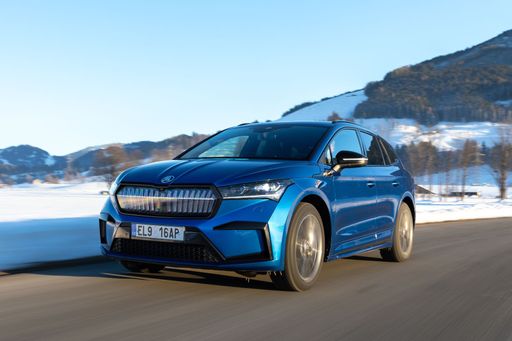 @ Škoda Auto a.s. / Škoda Storyboard
@ Škoda Auto a.s. / Škoda Storyboard
Skoda Enyaq
BMW X1
The BMW X1 brings a premium feel to compact crossover life, wrapping practical space and agile handling into a tidy, upscale package. It’s ideal for buyers who want BMW driving dynamics without the bulk, offering everyday comfort and a few clever tricks to keep the commute interesting.
details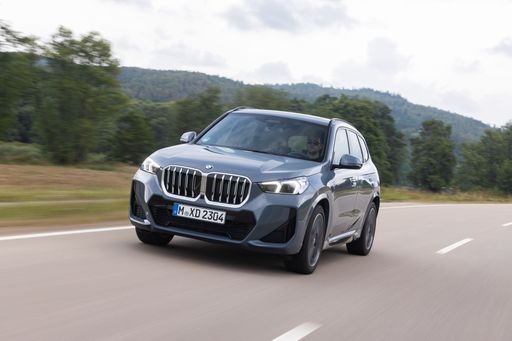 @ BMW Group Press
@ BMW Group Press
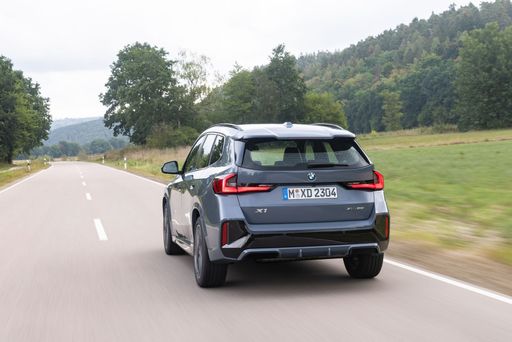 @ BMW Group Press
@ BMW Group Press
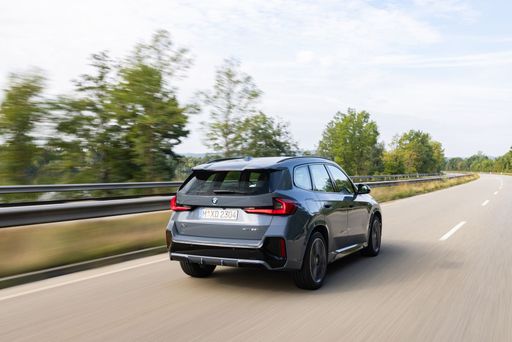 @ BMW Group Press
@ BMW Group Press
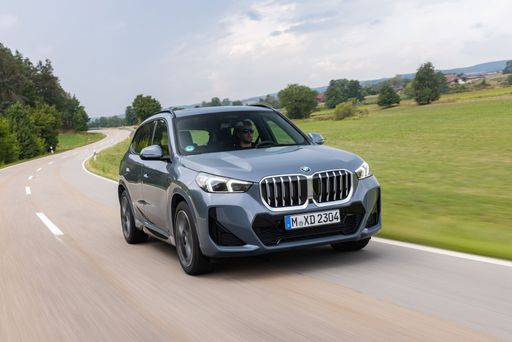 @ BMW Group Press
@ BMW Group Press
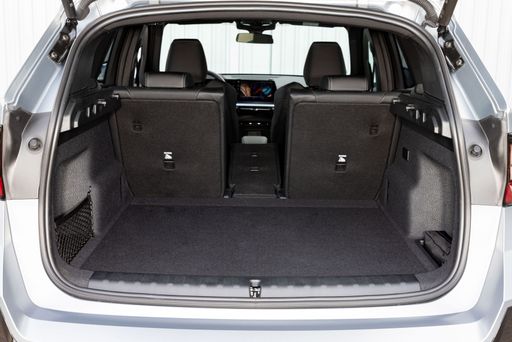 @ BMW Group Press
@ BMW Group Press
Skoda Enyaq
The Skoda Enyaq is a cleverly packaged electric SUV that blends roomy, pragmatic family space with clean, Czech design and sensible value. On the road it’s unshowy but composed, offering serene electric performance and easy-to-use tech — the kind of car that makes daily life smoother without trying too hard.
details @ Škoda Auto a.s. / Škoda Storyboard
@ Škoda Auto a.s. / Škoda Storyboard
 @ Škoda Auto a.s. / Škoda Storyboard
@ Škoda Auto a.s. / Škoda Storyboard
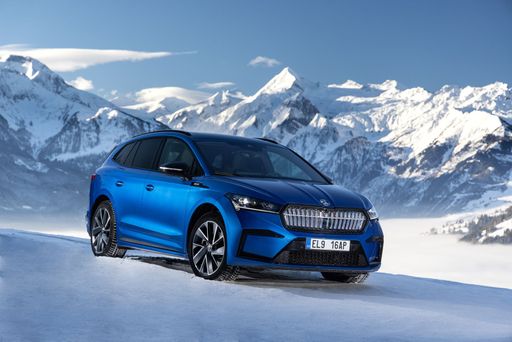 @ Škoda Auto a.s. / Škoda Storyboard
@ Škoda Auto a.s. / Škoda Storyboard
 @ Škoda Auto a.s. / Škoda Storyboard
@ Škoda Auto a.s. / Škoda Storyboard
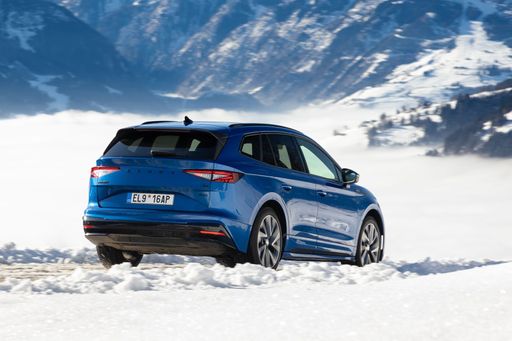 @ Škoda Auto a.s. / Škoda Storyboard
@ Škoda Auto a.s. / Škoda Storyboard
 @ BMW Group Press
@ BMW Group Press
|
 @ Škoda Auto a.s. / Škoda Storyboard
@ Škoda Auto a.s. / Škoda Storyboard
|
|
|
|
Costs and Consumption |
|
|---|---|
|
Price
38200 - 55500 £
|
Price
38100 - 52200 £
|
|
Consumption L/100km
2.5 - 7.7 L
|
Consumption L/100km
-
|
|
Consumption kWh/100km
-
|
Consumption kWh/100km
14.8 - 16.2 kWh
|
|
Electric Range
81 km
|
Electric Range
428 - 587 km
|
|
Battery Capacity
14.20 kWh
|
Battery Capacity
59 - 79 kWh
|
|
co2
57 - 175 g/km
|
co2
0 g/km
|
|
Fuel tank capacity
47 - 54 L
|
Fuel tank capacity
-
|
Dimensions and Body |
|
|---|---|
|
Body Type
SUV
|
Body Type
SUV
|
|
Seats
5
|
Seats
5
|
|
Doors
5
|
Doors
5
|
|
Curb weight
1575 - 1935 kg
|
Curb weight
2002 - 2293 kg
|
|
Trunk capacity
490 - 540 L
|
Trunk capacity
570 - 585 L
|
|
Length
4500 - 4505 mm
|
Length
4658 - 4660 mm
|
|
Width
1845 mm
|
Width
1879 mm
|
|
Height
1622 - 1642 mm
|
Height
1605 - 1625 mm
|
|
Max trunk capacity
1495 - 1600 L
|
Max trunk capacity
1610 - 1710 L
|
|
Payload
490 - 500 kg
|
Payload
457 - 509 kg
|
Engine and Performance |
|
|---|---|
|
Engine Type
Diesel MHEV, Petrol MHEV, Petrol, Diesel, Plugin Hybrid
|
Engine Type
Electric
|
|
Transmission
Automatic
|
Transmission
Automatic
|
|
Transmission Detail
Dual-Clutch Automatic
|
Transmission Detail
Reduction Gearbox
|
|
Drive Type
Front-Wheel Drive, All-Wheel Drive
|
Drive Type
Rear-Wheel Drive, All-Wheel Drive
|
|
Power HP
136 - 326 HP
|
Power HP
204 - 340 HP
|
|
Acceleration 0-100km/h
5.4 - 9.2 s
|
Acceleration 0-100km/h
5.4 - 8.1 s
|
|
Max Speed
190 - 250 km/h
|
Max Speed
160 - 180 km/h
|
|
Torque
230 - 477 Nm
|
Torque
310 - 679 Nm
|
|
Number of Cylinders
3 - 4
|
Number of Cylinders
-
|
|
Power kW
100 - 240 kW
|
Power kW
150 - 250 kW
|
|
Engine capacity
1499 - 1998 cm3
|
Engine capacity
-
|
General |
|
|---|---|
|
Model Year
2024 - 2025
|
Model Year
2025
|
|
CO2 Efficiency Class
D, E, F, B
|
CO2 Efficiency Class
A
|
|
Brand
BMW
|
Brand
Skoda
|
Is the BMW X1 offered with different drivetrains?
The BMW X1 is offered with Front-Wheel Drive or All-Wheel Drive.
The prices and data displayed are estimates based on German list prices and may vary by country. This information is not legally binding.
